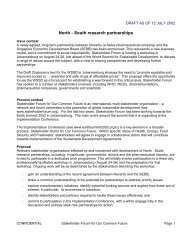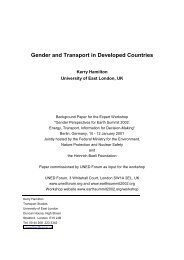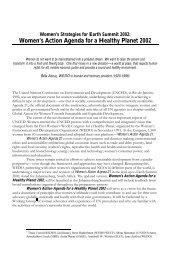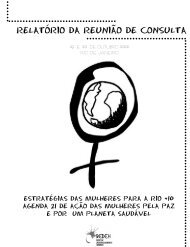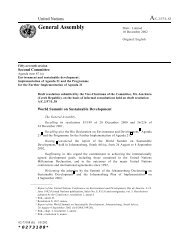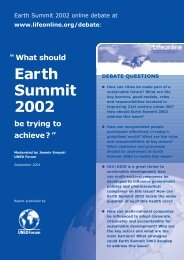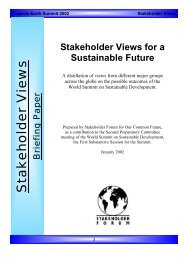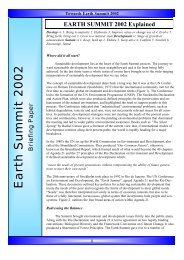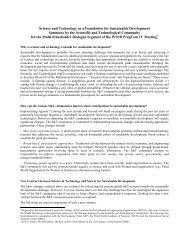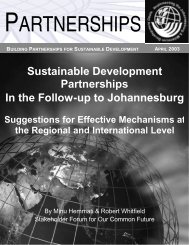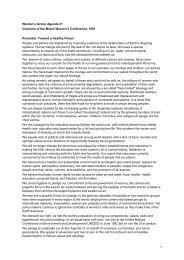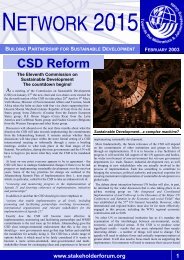Issue 19.pdf - Earth Summit 2002
Issue 19.pdf - Earth Summit 2002
Issue 19.pdf - Earth Summit 2002
Create successful ePaper yourself
Turn your PDF publications into a flip-book with our unique Google optimized e-Paper software.
Stakeholder-Forum Volume II - <strong>Issue</strong> IX March <strong>2002</strong><br />
STAKEHOLDER<br />
ACTION FOR OUR<br />
COMMON<br />
FUTURE.<br />
An Update<br />
Stakeholder Forum’s<br />
Implementation Conference:<br />
The second PrepCom in New<br />
York provided an excellent opportunity<br />
for side meetings, giving<br />
further momentum to the Stakeholder<br />
Action for Our Common<br />
Future process of the Implementation<br />
Conference (IC). Project Coordinators,<br />
Minu Hemmati &<br />
Robert Whitfield, report.<br />
Purpose of the Process<br />
PrepCom II reinforced the emphasis on<br />
sustainable development implementation<br />
and established a two pronged approach<br />
towards implementation. The first prong<br />
(Type 1 outcome) is the negotiation of an<br />
intergovernmental text that seeks to capture<br />
governments’ desire to accelerate<br />
progress towards sustainable development.<br />
The second prong (Type 2 outcomes)<br />
seeks to stimulate and capture<br />
explicit initiatives and partnerships that<br />
are designed to further the sustainable<br />
development agreements, whether they be between Governments,<br />
between Governments and stakeholders or between<br />
stakeholders themselves. Stakeholder Action for Our Common<br />
Future and the Implementation Conference (IC) were originally<br />
designed with very much the same objective in mind and are<br />
now firmly targeted to deliver outcomes that can be fed into the<br />
<strong>Summit</strong> as Type 2 outcomes.<br />
All five IC issues were developed during the two weeks either<br />
through dedicated dinner meetings or through a weekend workshop.<br />
Putting <strong>Issue</strong>s on the Table - Freshwater<br />
A dinner meeting was held for the Freshwater <strong>Issue</strong> Advisory<br />
Group which was the first meeting of the Group following an<br />
initial presentation of the IC to the Bonn Freshwater Dialogues<br />
Steering Group in Bonn last December. The group has been<br />
enlarged to take on some additional key stakeholders and held<br />
an initial exploratory discussion of some of the aspects of<br />
freshwater offering the best potential for collaborative stakeholder<br />
action. It also discussed the need for government and<br />
involvement of additional stakeholder groups such as small<br />
businesses and indigenous peoples. The group will be seeking<br />
to build on the Bonn outcomes, which identified key priorities<br />
for action and reaffirmed the need for the participation of all<br />
stakeholders and “new coalitions”. At the same time, the group<br />
will aim to pave the way for the 3 rd World Water Forum where<br />
progress on actions launched at the IC can be reviewed and<br />
presented at the international level for the first time. Possible<br />
focus areas include governance in the water sector; community-level<br />
risk management; capacity building, training and<br />
education; and others.<br />
For Food Security and for Renewable Energy, this was the<br />
first formal involvement of the participants in the process. The<br />
initiative was received very well and discussions focused on<br />
both process and substance.<br />
Food Security<br />
On Food Security, the group explored possible focus areas<br />
such as perverse subsidies, and ecosystem<br />
conservation. It also addressed<br />
possible linkages with the ongoing process<br />
on Sustainable Agriculture and Rural Development<br />
(SARD) which is being facilitated<br />
by the FAO, as well as links with<br />
ongoing campaigns on land right and secure<br />
tenure.<br />
Energy<br />
Discussions on Renewable Energy included<br />
work on energy-efficient buildings<br />
and solar homes, with one idea being to<br />
lobby towards the setting of a specific target<br />
of a number of solar homes to be established<br />
over the coming years – and the<br />
IC process to launch projects that will<br />
contribute to delivering the target. The<br />
need for more accessible and better managed<br />
hubs of information and knowledge<br />
on renewables was also discussed, as well<br />
as the possible need to extend the scope of<br />
the IC process towards “sustainable energy”.<br />
...this space<br />
Participants discussed the IC process visà-vis<br />
other ongoing initiatives, which should be linked with the<br />
IC process to the benefit of all parties.<br />
Demand for Dialogue<br />
Many felt that the multi-stakeholder process created by the IC<br />
is unique: It seeks to establish equitable relationships between<br />
stakeholder groups and to build on common ground between<br />
them without brushing over differences. It will encourage partnerships<br />
between those who wish to engage in them.<br />
It was encouraging to see that there was strong agreement on<br />
the need for stakeholder action and the general framework proposed<br />
by the IC process: implementation of Sustainable Development<br />
Agreements; the overall goal of poverty eradication<br />
and benefiting those most in need; the goal of contributing to<br />
social inclusion and empowerment, good governance, and gender<br />
equity.<br />
In all cases, participants started to identify work that their organisations<br />
are undertaking or planning and which they will<br />
bring into the IC process to develop partnerships with others<br />
and thus broaden the scope and impact of the work.<br />
All groups discussed how to use the IC space to identify spe-<br />
www.earthsummit<strong>2002</strong>.org 4




